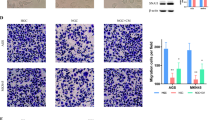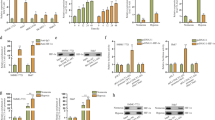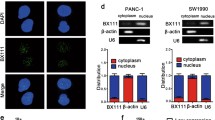Abstract
Purpose
Hypoxia is an indispensable factor in the progression of metastasis. Hypoxia inducible factor-1α (HIF-1α), the core element in generating the hypoxia response, induces invasion and metastasis by promoting epithelial–mesenchymal transition (EMT). This study explored the underlying mechanism of hypoxia associated with the invasion and metastasis of gastric cancer (GC).
Methods
Six methods were employed to assess the function of the long noncoding RNA (lncRNA) prostate cancer gene expression marker 1 (PCGEM1) including gene silencing, RT-PCR, the separation of nuclear and cytoplasmic fractions, scrape motility assay, transwell migration assay, and Western-blot.
Results
LncRNA PCGEM1 was overexpressed in GC cells and tissues, and was induced by hypoxia in GC cells. Additional experiments confirmed that the knockdown of PCGEM1 significantly repressed the invasion and metastasis of GC cells. SNAI1, a key transcription factor of EMT, was regulated by PCGEM1. Overexpression of SNAI1 rescued the inhibition of PCGEM1-knockdown during the invasion and metastasis of GC cells. In addition, PCGEM1 and SNAI1 jointly affected the biomarkers of EMT.
Conclusion
Our findings indicated that PCGEM1 is a hypoxia-responsive lncRNA, and contributes to the invasion and metastasis of GC. The potential mechanism is attributed to the regulation of EMT by PCGEM1 and its influence on the expression of SNAI1.





Similar content being viewed by others
References
Siegel RL, Miller KD, Jemal A. Cancer statistics, 2017. A Cancer J Clin. 2017;7(1):7–30. https://doi.org/10.3322/caac.21387.
Wilson WR, Hay MP. Targeting hypoxia in cancer therapy. Nat Rev Cancer. 2011;11(6):393–410. https://doi.org/10.1038/nrc3064.
Koyasu S, Kobayashi M, Goto Y, Hiraoka M, Harada H. Regulatory mechanisms of hypoxia-inducible factor 1 activity: two decades of knowledge. Cancer Sci. 2018;109(3):560–71. https://doi.org/10.1111/cas.13483.
Tsai YP, Chen HF, Chen SY, Cheng WC, Wang HW, Shen ZJ, et al. TET1 regulates hypoxia-induced epithelial-mesenchymal transition by acting as a co-activator. Genome Biol. 2014;15(12):513. https://doi.org/10.1186/s13059-014-0513-0.
Rankin EB, Giaccia AJ. Hypoxic control of metastasis. Science (New York, NY). 2016;352(6282):175–80. https://doi.org/10.1126/science.aaf4405.
Zhang J, Wu Y, Lin YH, Guo S, Ning PF, Zheng ZC, et al. Prognostic value of hypoxia-inducible factor-1 alpha and prolyl 4-hydroxylase beta polypeptide overexpression in gastric cancer. World J Gastroenterol. 2018;24(22):2381–91. https://doi.org/10.3748/wjg.v24.i22.2381.
Djebali S, Davis CA, Merkel A, Dobin A, Lassmann T, Mortazavi A, et al. Landscape of transcription in human cells. Nature. 2012;489(7414):101–8. https://doi.org/10.1038/nature11233.
Schmitt AM, Chang HY. Long noncoding RNAs in cancer pathways. Cancer Cell. 2016;29(4):452–63. https://doi.org/10.1016/j.ccell.2016.03.010.
Lau E. Non-coding RNA: zooming in on lncRNA functions. Nat Rev Genet. 2014;15(9):574–5. https://doi.org/10.1038/nrg3795.
Brady LK, Wang H, Radens CM, Bi Y, Radovich M, Maity A, et al. Transcriptome analysis of hypoxic cancer cells uncovers intron retention in EIF2B5 as a mechanism to inhibit translation. PLoS Biol. 2017;15(9):e2002623. https://doi.org/10.1371/journal.pbio.2002623.
Wu X, Tudoran OM, Calin GA, Ivan M. The many faces of long noncoding RNAs in cancer. Antioxid Redox Signal. 2018;29(9):922–35. https://doi.org/10.1089/ars.2017.7293.
Liu L, Zhao X, Zou H, Bai R, Yang K, Tian Z. Hypoxia promotes gastric cancer malignancy partly through the HIF-1alpha dependent transcriptional activation of the long non-coding RNA GAPLINC. Front Physiol. 2016;7:420. https://doi.org/10.3389/fphys.2016.00420.
Chen WM, Huang MD, Kong R, Xu TP, Zhang EB, Xia R, et al. Antisense long noncoding RNA HIF1A-AS2 Is upregulated in gastric cancer and associated with poor prognosis. Dig Dis Sci. 2015;60(6):1655–62. https://doi.org/10.1007/s10620-015-3524-0.
Liu X, Wang Y, Sun L, Min J, Liu J, Chen D, et al. Long noncoding RNA BC005927 upregulates EPHB4 and promotes gastric cancer metastasis under hypoxia. Cancer Sci. 2018;109(4):988–1000. https://doi.org/10.1111/cas.13519.
Wang Y, Liu X, Zhang H, Sun L, Zhou Y, Jin H, et al. Hypoxia-inducible lncRNA-AK058003 promotes gastric cancer metastasis by targeting gamma-synuclein. Neoplasia (New York, NY). 2014;16(12):1094–106. https://doi.org/10.1016/j.neo.2014.10.008.
Yang Z, Wang R, Zhang T, Dong X. Hypoxia/lncRNA-AK123072/EGFR pathway induced metastasis and invasion in gastric cancer. Int J Clin Exp Med. 2015;8(11):19954–68.
Lamouille S, Xu J, Derynck R. Molecular mechanisms of epithelial-mesenchymal transition. Nat Rev Mol Cell Biol. 2014;15(3):178–96. https://doi.org/10.1038/nrm3758.
Srikantan V, Zou Z, Petrovics G, Xu L, Augustus M, Davis L, et al. PCGEM1, a prostate-specific gene, is overexpressed in prostate cancer. Proc Natl Acad Sci USA. 2000;97(22):12216–21. https://doi.org/10.1073/pnas.97.22.12216.
Luo D, Wang J, Li J, Post M. Mouse snail is a target gene for HIF. Mol Cancer Res. 2011;9(2):234–45. https://doi.org/10.1158/1541-7786.mcr-10-0214.
Deng SJ, Chen HY, Ye Z, Deng SC, Zhu S, Zeng Z. Hypoxia-induced LncRNA-BX111 promotes metastasis and progression of pancreatic cancer through regulating ZEB1 transcription. Oncogene. 2018. https://doi.org/10.1038/s41388-018-0382-1.
Matouk IJ, DeGroot N, Mezan S, Ayesh S, Abu-lail R, Hochberg A, et al. The H19 non-coding RNA is essential for human tumor growth. PLoS One. 2007;2(9):e845. https://doi.org/10.1371/journal.pone.0000845.
Matouk IJ, Raveh E, Abu-lail R, Mezan S, Gilon M, Gershtain E, et al. Oncofetal H19 RNA promotes tumor metastasis. Biochem Biophys Acta. 2014;1843(7):1414–26. https://doi.org/10.1016/j.bbamcr.2014.03.023.
Nishizawa Y, Konno M, Asai A, Koseki J, Kawamoto K, Miyoshi N, et al. Hypoxia stimulates the cytoplasmic localization of oncogenic long noncoding RNA LINC00152 in colorectal cancer. Int J Oncol. 2018;52(2):453–60. https://doi.org/10.3892/ijo.2017.4218.
Zhang A, Zhang J, Kaipainen A, Lucas JM, Yang H. Long non-coding RNA: a newly deciphered “code” in prostate cancer. Cancer Lett. 2016;375(2):323–30. https://doi.org/10.1016/j.canlet.2016.03.003.
Zhang S, Li Z, Zhang L, Xu Z. MEF2 activated long noncoding RNA PCGEM1 promotes cell proliferation in hormone refractory prostate cancer through downregulation of miR148a. Mol Med Rep. 2018;18(1):202–8. https://doi.org/10.3892/mmr.2018.8977.
Ho TT, Huang J, Zhou N, Zhang Z, Koirala P, Zhou X, et al. Regulation of PCGEM1 by p54/nrb in prostate cancer. Sci Rep. 2016;6:34529. https://doi.org/10.1038/srep34529.
Chen S, Wang LL, Sun KX, Liu Y, Guan X, Zong ZH, et al. LncRNA PCGEM1 induces ovarian carcinoma tumorigenesis and progression through RhoA pathway. Cell Physiol Biochem. 2018;47(4):1578–88. https://doi.org/10.1159/000490931.
Li Q, Shen F, Zhao L. The relationship between lncRNA PCGEM1 and STAT3 during the occurrence and development of endometrial carcinoma. Biomed Pharmacother Biomed Pharmacother. 2018;107:918–28. https://doi.org/10.1016/j.biopha.2018.08.091.
Park JY, Lee JE, Park JB, Yoo H, Lee SH, Kim JH. Roles of long non-coding RNAs on tumorigenesis and glioma development. Brain Tumor Res Treat. 2014;2(1):1–6. https://doi.org/10.14791/btrt.2014.2.1.1.
Funding
Liaoning S&T Project (20180550971). Liaoning provincial special Fund for central guiding local science and technology development plan (2018416017)
Author information
Authors and Affiliations
Contributions
ZJ performed the majority of experiments and analyzed the data and drafted the manuscript; ZZC, ZY designed the research; WY, YD, MXY conducted the molecular biology assays and assisted in writing the manuscript; GS, WY collected and analyzed the data; ZY provided critical revision of the manuscript for important intellectual content. JHY provided critical revision of the manuscript for important intellectual content.
Corresponding author
Ethics declarations
Conflict of interest
The authors declare that there are no conflicts of interest related to this study.
Informed consent
Informed consent was obtained from all individual participants included in the study.
Additional information
Publisher's Note
Springer Nature remains neutral with regard to jurisdictional claims in published maps and institutional affiliations.
Rights and permissions
About this article
Cite this article
Zhang, J., Jin, H.Y., Wu, Y. et al. Hypoxia-induced LncRNA PCGEM1 promotes invasion and metastasis of gastric cancer through regulating SNAI1. Clin Transl Oncol 21, 1142–1151 (2019). https://doi.org/10.1007/s12094-019-02035-9
Received:
Accepted:
Published:
Issue Date:
DOI: https://doi.org/10.1007/s12094-019-02035-9




